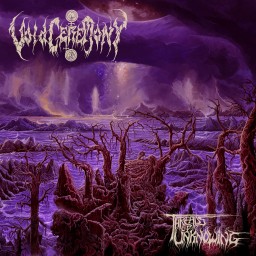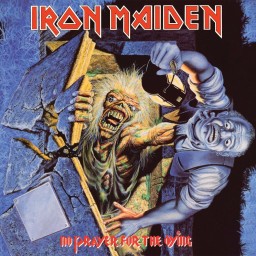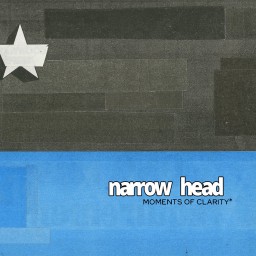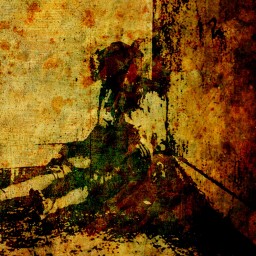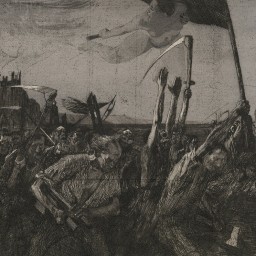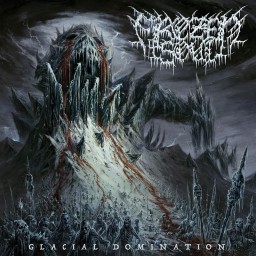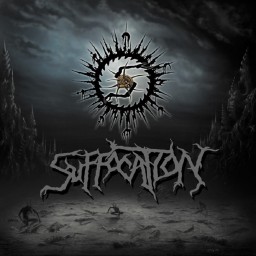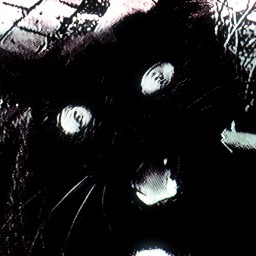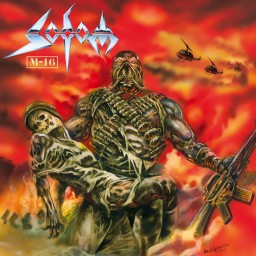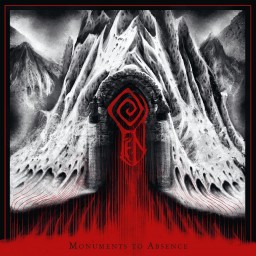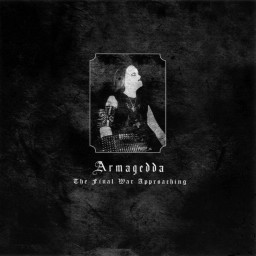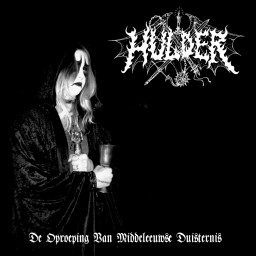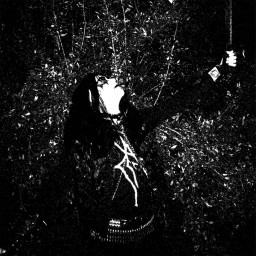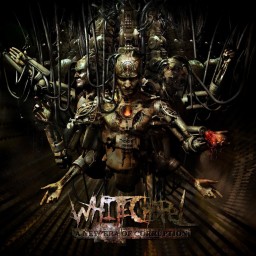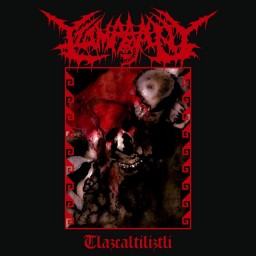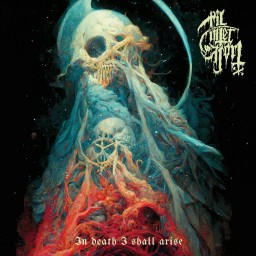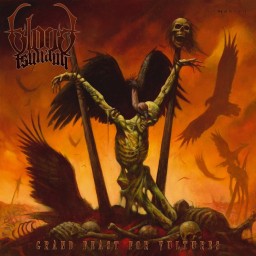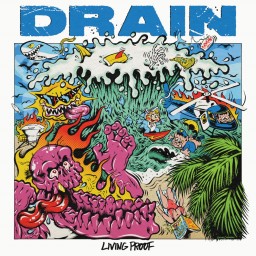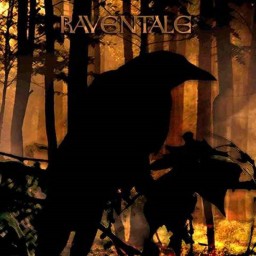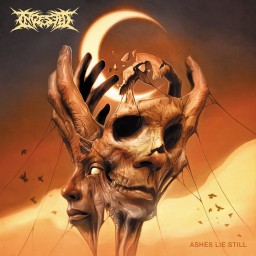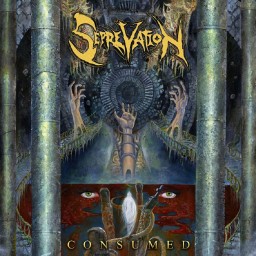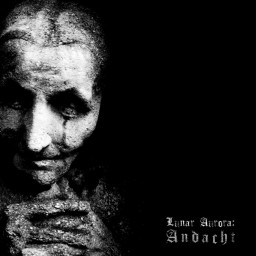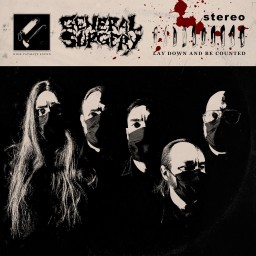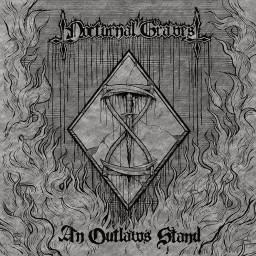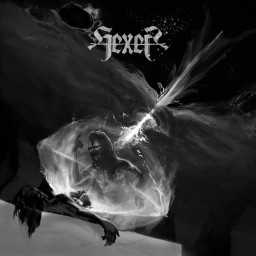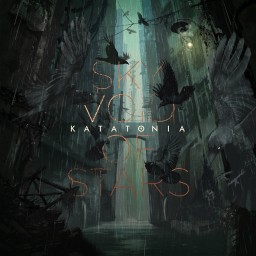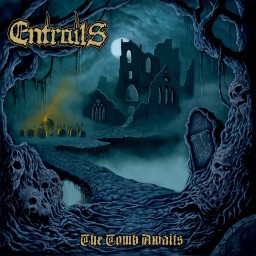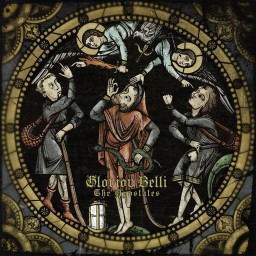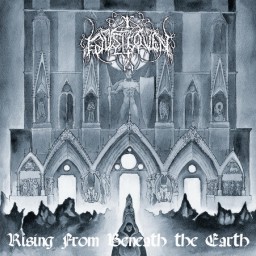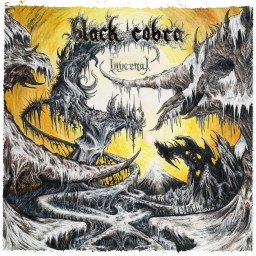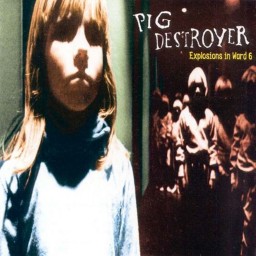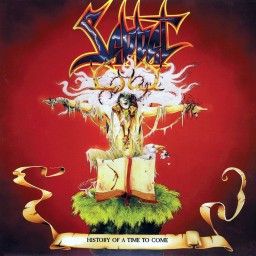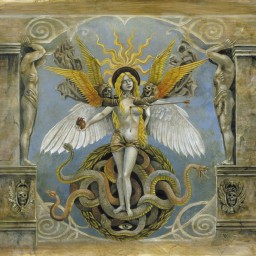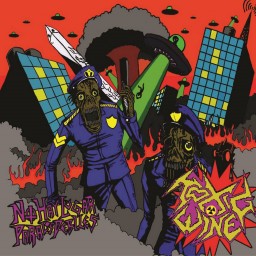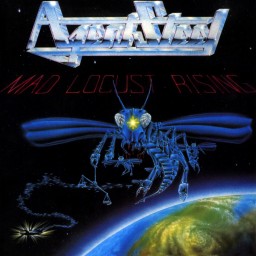Vinny's Reviews
Following my immediate purchase on CD of VoidCeremony's debut album in 2020 after just a couple of streams online, I was keeping an eye out for the follow up for what felt like an eternity. With its bass-heavy presence the debut took the prog element of prog-death and put it on a plinth all of its own before surrounding it with some great OSDM vibes to ground proceedings nicely. Some three years later and Threads of Unknowing picks up essentially where Entropic Reflections Continuum: Dimensional Unravel left off. Damon Good's bass still commands a lot of attention (and rightly so) and that OSDM vibe is still present also, thankfully.
The main immediate difference to note this time is that production job that makes the drums sound like they are incredibly brittle. Despite the obvious hard work of Charles Koryn, his efforts are stifled somewhat by knob-twiddler, Gabriele Gramaglia. The leads shine well enough though. Soaring and uplifting, they do a quality job of expanded the soundscape of Threads... without giving us any pretentious traits to get annoyed over. These cleaner, more progressive elements are the strongest part of the album for me and I agree that VoidCermony do work better as a progressive outfit as opposed to a technical/prog-death band. I do not have a problem with the vocals actually. I can see where the aversion comes from but I find them perfectly acceptable.
Whilst I am not as instantly blown away by their sophomore album, I still find Threads of Unknowing to be a solid record and one that does grow with each listen. Yes, it is bottom-heavy, with the second half of the record easily outstripping the first half, but this is still a mighty fine album, delivered by some very professional sounding individuals. Drums aside, I have no real issue here.
Genres: Death Metal Progressive Metal
Format: Album
Year: 2023
The debut EP from Isis shows a remarkable level of maturity. The build to opening track Poison Eggs sounds like it is written by a band some ten years into their existence, not just twelve months as was the case with the band at the time. This release shows just why Isis grew into staples of the sludge metal world. Whilst there are spades of aggression and harshness for the listener to feast upon, there is a restraint to elements of the violence also. Underlined by the tightness of the performances, as a whole The Mosquito Control is a real force to be reckoned with.
At not even a full half hour, there still feels a lot of activity to process on this EP. Tracks shift and lurch beneath the monumental weight of the noise created by the fusion of drums, guitars, bass and vocals. Yet no track ever descends into full-blown chaos, even on the manic Life Under the Swatter there is a more subtle passage that tempers the frantic pace and tempo really well, giving the listener a slight breather before launching them straight back into the pulsating fury of the track again. The standout performance on the EP is without doubt Aaron Turner's vocals. Rabid to the point of leaving him breathless, they fit so well with the instrumentation it is literally a marriage made in heaven. That is not say that the rest of the group take a back seat. The stabbing groove of the riff that starts Hive Destruction proper is infectious as fuck and I find myself clamouring for its urgent cuts as the slower, doomier riffs take precedent. Likewise, the motoring bass of Jeff Caxide drives this sense of urgency and control throughout the whole EP, whilst Aaron Harris puts an amazing shift in on the drums.
The heaviness on display throughout The Mosquito Control is relentless. Listen to any modern sludge act like Primitive Man and you will here the poisonous fury of Relocation Swarm as cornerstones of most of what they do. This is possibly one the heaviest releases I have heard in my life and the production and mix job leaves it all sounding so fresh and organic. This is oppressive music that is ironically very freeing an experience to listen to. You absolutely should give this the attention it commands. There are no short measures of focus allowed when listening to The Mosquito Control, close all the blinds/curtains, turn all non-essential devices off and let the music take you.
Genres: Sludge Metal
Format: EP
Year: 1998
As the 90's began with the promise of so much to come from the more extreme ends of metal, Iron Maiden released an album that clearly marked their decline. No Prayer for the Dying took the more commercial, catchy elements of Seventh Son of a Seventh Son and went mental with them. With Adrian Smith gone the band added Janick Gers to their line up in his place. With Smith's exit, so to seemingly went the penchant for solid song writing and interesting structures, replaced instead with absolute smash and grab, single fodder. The likes of Tailgunner, Holy Smoke and of course Bring Your Daughter...to the Slaughter (a track supposedly written by Dickinson for the movie soundtrack to Nightmare on Elm Street 5) all providing us with incessant itches in our brains for years to come.
They did this commerciality really well mind. Although the bulk of the album is soulless overall, audiences still lapped it up with over 3 million copies of the record sold across the globe. Even the less commercially attractive tunes such as The Assassin and Run Silent, Run Deep had enough of a chorus line to stick in the lug 'oles long after the album had finished and of course we cannot get any closer to blatant quick wins for zero effort than Hooks In You. What all these attempts at hits did was simply underline how awful the remainder of the record truly was. The lacklustre and instantly forgettable title track alongside the dreadful Fates Warning being perfect examples of this.
Add to this the genuine clumsiness of Public Enema Number One and Mother Russia and we have no individual track that I can find anything positive to say about. Playing it back through in my head (as I don't actually need to reach for the CD - which I guess is testimony to the "catchy quest" being a success) now it genuinely feels like a sell-out record and one that had I not only just been discovering metal at the time would likely have not made it in to my collection at all.
Genres: Heavy Metal
Format: Album
Year: 1990
The promise of some Deftones influence in any band's sound instantly puts them on a solid footing for me to venture into checking out at least one or more of their releases. Narrow Head do not fail to live up to that promise either. There are times during Moments of Clarity when you could be forgiven for thinking they are the Deftones. They wear that influence on their sleeves with pride and do a very good job of representing the nu-metal/hazy alternative metal sound along the way. My problem with MoC is not that it anyway apes or simply copies an already well-sampled blueprint. The issue I have with this record is simply that is boring.
There is an overwhelming sense of positivity in the sound of Narrow Head that I just cannot bear. Notwithstanding that I am most definitely not a happy person 90% of the time, the good vibes here are still too much and the album fails to shine with any maturity or sensibility at all. Tracks just seem to merge into one. With no depth to the song writing there are no standout moments to pick up on and no variance in the emotions to hammer home any real point to the record.
My forays into The Gateway are very infrequent and it is the fear of finding records like this that give me that mindset. Far too safe and far too staid as a result.
Genres: Alternative Metal
Format: Album
Year: 2023
For a while it was looking like my review of “Reeking Pained and Shuddering” was going the same way of 2020’s “I Speak the Truth…” in terms of me struggling to actually articulate any individual standout parts. As with that later release, the 2007 offering is upon first listen a chaotic and often unsettling affair, but on this particular ride that unsettling nature is delivered beyond just the maelstrom of sounds that we are presented with. To these ears, “Reeking…” presents with a lot more control and conscious effort to disturb the listener with some good old fashioned atmospherics and samples.
Look past the scathing vocals and clatter and clashes of industrial influence and you will hear a cinematic dark ambience to this record. I had to make a rare excursion into using my headphones to truly appreciate the qualities on show here (something which my ears will suffer for today I am sure). The time taken, sat in a dark hotel room with no external distractions to take my focus off the stimulation my ears where receiving gave me the chance to track the proper structures that sit in amongst the torrent of terror of most tracks. These consistent elements seem to take the form of droning atmospheres that provide a dense foundation layer to the tracks.
The samples from various horror films and other macabre sources, work well and add depth to what could otherwise be barren soundscapes in terms of a perceived human touch. Ranging from the dramatic to the downright weird, they offer snapshots of madness into an already demented routine. Here again though is where I struggle a bit with the record. There is a lot going on and so if you are looking for memorability, those snippets that you hold onto, subconsciously or otherwise, then you are going to struggle here. For me, there would be no dialling down of the extremity if a few less ideas made it onto the record as the consistent parts develop an environment all of their own. This is still a good record though, albeit one that I would not consciously be drawn back to on a regular basis. I am coming to view Gnaw Their Tongue releases as occasional jolts to the system to remind me that the blueprint of structures can be torn up and form can be sacrificed for all out expression of the true turmoil within some artists.
Genres: Black Metal
Format: Album
Year: 2007
On paper, Panzerfaust do not have a lot going for them. With a sound not dissimilar to Mgla whom I have never really seen the total appeal of over the years, the fact that any of their releases have lasted more than one listen is an achievement in itself. However, whilst I do accept those references to the Polish band I believe there's more to the Canadians that just the dashing black metal sound that draws the similarity. I am familiar with the releases that precede and follow this one and so my experience of the band overall draws me to reference elements of Deathspell Omega (although a lot less chaotic) and my personal favourites Gaerea also. Something in that mix of stabbing dissonance and a taught emotional core just thrusting to get out and spill its guts everywhere just speaks volumes to me and the second chapter of The Suns of Perdition series of albums best exemplifies this for me.
There is an urgency to ...Render Unto Eden that feels like the itch of a skin infection that has some festering fluid to release but continues to taunt the afflicted by prolonging the incessant, gnawing sensation. At the same time, there is a lot of structure to this record. These tracks are well-written and are allowed to develop well on each occasion. Opener, Promethean Fire has a superb build that makes the listener wait for its arrival proper by layering the textures slowly but surely. At the same time, the flurrying melodies of Areopagitica will have you palpitating as you try to keep up. What I hear on this record is a band exuding a level of intelligent restraint. Having the heart to share some influences without necessarily wearing them on their sleeves, yet at the same time having the common sense to not let the urgency of their style substitute structure and track development.
The drums on The Snare of the Fowler act like tools to build up to the the almost Ulcerate-esque melodic riff. Indeed Alexander Kartashov shows a prowess on the drums for pretty much all of the record and the bellicose (and it has to be said rather Nergal-like) vocals of Goliath are also a standout. But it is the chiming, stabbing and soaring work of the guitar of Brock "Kaizer" Van Dijk that truly steals the show here as those ringing tremolos capture the ghastly melodies and haunting dissonance inherent in the Panzerfaust sound. I guess there is a deeper story to the album trilogy here that I am yet to tap into, but for now let me acknowledge what a fine record this is - regardless of any conceptual references overall.
Genres: Black Metal
Format: Album
Year: 2020
I am on a Canadian black metal deep dive at present, trying to seek out the essential releases for review. As I tried to plot this course through the vast landscape of one of the biggest land masses on the planet, I immediately stumbled on Sorcier Des Glaces. One of the first black metal releases listed on Metal Academy as being from Canada (there will be earlier ones I am sure), the 1998 debut from SDG is an atmospheric affair that focuses on dark forests, wintery landscapes, and the misanthropic appreciation of nature. The whole album was rerecorded in 2012 (Snowland MMXII) with a less raw production and less keyboards. For this review, I am listening to the original debut album.
Those keys that got a trim in the rerecorded version certainly make their presence felt here. They successfully drive the tracks forwards without taking over from any of the required force of the riffs and percussion sections. They most certainly help with that atmospheric feel to the album but are by no means stealing the show. Also, in terms of the production, although I would not say it is perfect, I have most certainly heard worse and in all honesty (on a black metal record) I prefer it to the more polished rerecorded version. Yes, there is an element of the tremolos sounding like someone is pissing about with the fader on the mixing desk, but it is by no means a distraction.
Perhaps the biggest victim of the original mix are the drums. In the wilder moments of some tracks, we hear more of the “tish” of the cymbals than we do of the actual beats. This is a shame because they are competently performed by Luc Gaulin, just a little lost in the grander scheme of things. However, I think in many ways this enhances the cold and sterile aspects of this album by way of contrast to those richer (but no warmer) keyboards.
Vocally, the throaty rasp of Sébastian Robitalle is a real force to be reckoned with throughout Snowland. Some of the layering effects on My Journey in the Black Forest add a real sense of threat to the track but it is that haughty depth in his vocals that provides such an excellent foundation to build from. In their more expansive moments, the duo reminds me of Paysage d’ Hiver and when the instrumental track Darkness Covers the Snowland comes in it brings such influences as Emperor and Summoning to mind.
There are a couple of occasions where the melodic soar of the guitar is allowed free-reign, and this works well in adding some crystalline lushness to proceedings before giving way to a more tremolo driven style of playing usually. All in all, Snowland is a fine start to my Canadian bm exploration. Whilst most certainly not without fault, it still represents an ambition and crude determination to succeed in the face of some challenges.
Genres: Black Metal
Format: Album
Year: 1998
The debut album from Texas death metal aficionados Frozen Soul was a chunky, enjoyable yet strangely staid affair overall. The riffs and vocals were top notch it should be noted but the variance factor on the song structures was low and although the song writing was of reasonable quality they suffered from a muchness of similarity across the release. Two years on and it seems Frozen Soul are everywhere, touring the shit out of the globe and getting props left, right and centre. From the humble beginnings of Maggot Stomp Records to an established artist on Century Media, these guys have progressed their career nicely in a little over five years.
Indeed, this increased exposure has seen them be able to collaborate with the likes of Matt Heafy, Reese Alavi, Blake Ibanez, John Gallagher and retro-electro artist Gost on Glacial Domination. I find it odd then that the sophomore release varies little from the debut offering and as a result I find myself writing a very similar review for it. All the riffs and ghastly death metal vocals in the world can only go so far if they are just regurgitated over eleven tracks. Even the collaboration tracks (five of them) are not all that different from the main game plan. The additional vocals, guitar or programming input seems incredibly sparse in terms of influencing the sound in any obvious form.
You can still hear the retro-Bolt Thrower vibes galore on here, just as you could on Crypt of Ice. Again, the appeal of this soon diminishes when it is so consistent, track after track. The simplicity of proceedings does not breed a welcome familiarity at all and I find it very hard to distinguish individual tracks as being standouts. With a slow to mid-pace tempo adopted for most of the album it borderlines on tortuous in places. You cannot rely on the crayons and finger-paint choruses of Abonimable to please a hardened death metal fan like me I am afraid guys. It harks of a desperate bid for mass appeal, crowd pleasing death metal that the band are much, much better than (or at least I thought). One album of this was entertaining. Two quickly gets boring and I am one more release away from simply not bothering again.
Genres: Death Metal
Format: Album
Year: 2023
For all the influence and respect that Suffocation (rightfully) receive across the extreme metal community, their game plan is not particularly a difficult one to follow. With the talent in the band it seems almost effortless for them to take the depths of brutality and the fast flowing torrents of technicality and combine them into this vicious and yet measured assault that I have come to enjoy over the years. Whether it is the frenzied attack of the debut album some fifteen years before this or the tangible and tactile structures of Pierced From Within or Effigy of the Forgotten, the band have medals of honour littered throughout their discography. Yet, at the same time they have "the rest of their discography". The likes of Despise the Sun, Blood Oath and indeed this month's feature release never get anywhere near the same levels of rotation as the aforementioned releases do. Within minutes of listening to the self-titled it is clear that this most certainly is not Pierced from Within, but then again I would not want it to be in all honesty. Despite not living up to that standard, Suffocation is by no means a bad or even mediocre death metal album.
The album feels restrained in its delivery yes, but by no means is this at the expense of entertainment and most certainly is not Suffocation going soft. Instead, the record feels like it is simply exploring all the good parts of the bands sound in glorious detail. By varying the pace across the record, the band create a celebration of themselves. They leave themselves completely exposed in some regards but the quality of the song writing is so high that there is little to no threat here for them. Tracks like Bind Torture Kill explore the full gamut of their range and you can hear the old school roots of their existence shining through very clearly. As we have come to expect, Hobbs' guitar laying is nothing short of exemplary and original guitarist Guy Marchais supports well also. Mullen, of course, can do no wrong as we already know and puts in a consistent and entertaining performance throughout with his clear yet still inherently extreme vocals providing their grim and scathing attack as always.
I feel like there are times when the drums of Mike Smith get a bit of a poor representation in the mix (opening track Oblivion springs to mind as being a noticeable point of this issue for me) but there is still enough weight to them to make them an integral part of the overall experience. With so much quality on show, I guess mixing the record to let all parts shine is a challenge I personally would not want to take on so Joe Cincotta has my sympathy on this. But there is nothing here to take away from this self-homage that Suffocation create on a record that needs a lot more attention from me than it has had to date. Bangers like Entrails of You are evidence that there is more than just shock value to the content of Suffocation, their brand of extremity has thought and feel behind it.
Genres: Death Metal
Format: Album
Year: 2006
Quite where electronic musician and DJ Aaron Spectre sits in the world of metal is open to interpretation. His early passion from his youth in Massachusetts for hardcore and metal is blended in Drumcorps with his more intense electronic flirtations from when he moved to New York and became immersed in the breakcore scene, establishing himself as a tour de force. Better Days is ten minutes of intense and scathing music that suits the grindcore tag whilst also offering some insight into the more experimental realms of metal also.
The grooving and jarring riff of the opening track introduces a track that espouses some elements of industrial repetition and meanwhile the hectic drum n' bass intro to On A Mission soon gives way to the harsh, grinding mechanised rhythm you'd expect based on the two tracks that precede it. The guitar and vocal work are entirely Spectre's own work (as of course are the hectic beats and blooping sounds that accompany them) and he certainly has plenty to get off his chest by the sounds of it.
Whilst a challenging release in some regards, Better Days is also very rhythmic also and after a couple of spins it leaves an impression in your head that is hard to shake off. It is like a less conscientious HEALTH release without ever getting into the realm of being inaccessible or possessing a modern primitivity to make it an all out assault on the senses from the more metal inspired aspects of the release. I do not see many revisits, however for a quick ten minute blast of something a bit different, it kind of works.
Genres: Grindcore
Format: EP
Year: 2021
Where to start with Sodom, eh? The grandfathers of Teutonic thrash metal as I view them today were still a little under twenty years into their existence at the point of them recording M-16. With a stable line-up in place for the past four years, the band were starting to look like they were hitting a solid run of form with ‘Til Death Do Us Unite and Code Red being improvements on the lacklustre Masquerade in Blood. The stage was well set then for them to continue this run with M-16.
With typically eye-catching artwork adorning the cover, the tracks soon follow this blistering war theme with the relentless pummeling of I Am the War in particular presenting a salvo of Angelripper spat bullets early on in proceedings. These faster paced thrashers such as Genocide are where the album really shines with these, the title track and Lead Injection being the better written of the tracks on offer.
At the same time though there are some goofy and clumsy moments as well. The incredibly corny Napalm in the Morning, the borderline irritating Little Boy and that fucking terrible Surfin' Bird cover are all examples of where a full near fifty-minutes of runtime was not necessarily needed. Even in the better tracks on the album, I would still say that for all the pace and frenzy there is not always the equal amount of punch to really elevate M16 to any real highlight in the band’s discography. This is most certainly not an album that will wrestle Agent Orange from the top spot in my all-time favourite Sodom records.
Whilst hinting at some of the better parts of the Sodom kitbag, this record comes off as being al little more than average in all honesty and it is not one that I have plans to be revisiting anytime soon. There are better records further along in the back-catalogue that you would get more from.
Genres: Thrash Metal
Format: Album
Year: 2001
My initial listens to Monuments to Absence saw me struggling to come to terms with the aggressive and pummeling assault that presented itself upon the likes of Scouring Ignorance which opens the album in such a furious fashion. At the same time, I found myself somewhat at odds with the cleaner vocal sections that permeated the album with what I initially deemed to be a near uncomfortable abundance. It had been a while since I had span Winter, which had impressed me enough to warrant a CD purchase when that got released back in 2017, and I could not recall the band being this aggressive sounding for some odd reason.
Having now worked my way through several listens, I now am much more at peace with what I am hearing. This is mainly because that additional listening has led to me to understand just how complete an experience Monuments to Absence is. Despite its inherent violence, there is an underlying benign attentiveness to the foundations of some of the tracks that stray away from any common black metal ethics and instead are more comfortable to root the playing in a post-metal or even post-rock mentality. Listen to the bass and the percussion at times and they play indie/alternative passages also. I have had to listen hard to pick this up, but this is one of the true successes of this album for me, it rewards with repeated visits.
The scathing black metal that sits atop this unexpected restraint is much less subtle of course (otherwise I doubt I would be reviewing this release). The punishing drums and grim vocals serve as ample reminder of where Fen’s heart lies when it comes to the driving force behind the band, it is just that there is plenty of room on this album to accommodate so much more musical direction as well. Monuments to Absence is a big sounding record, albeit one that never quite achieves a Drudkh level of expansiveness. It still successfully marries the intensity of black metal with the relentless beauty of nature though and steers the listener down some different avenues of exploration.
I still cannot get on with those cleaner vocals though. They are more like pagan chants as opposed to any heartfelt crooning, yet they somehow miss out on feeling like they have any relevance to what is going on around them. This, coupled with a slightly longer than ideal runtime keeps the record away from the top mark range. However, this is still a great record and one that I sense will receive many repeat visits in the coming weeks and months.
Genres: Black Metal
Format: Album
Year: 2023
The past few months I have been listening to a lot of modern day Darkthrone and have reviewed a couple of recent records from the Norwegian legends of black metal, commenting how they sound very little like their bm heyday. This has been something to celebrate in my opinion as they truly have reinvented themselves in comparison to the band that dropped A Blaze... and Transilvanian Hunger some thirty years ago. If ever proof was needed that the influence of black metal era Fenriz and NC is always destined to be alive and kicking then Armagedda are it. Notwithstanding that at the time of this release, Darkthrone were dropping Plaguewielder, one of their less popular releases and one that was certainly far away from the quality of their nineties' output. There is an argument to say that come 2001, Armagedda were better at being Darkthrone than Darkthrone were at the time.
Talk of obvious influences aside, Armagedda themselves were only two years into their existence come the release of their debut album. Having formed as Volkermord in 1999 before changing their name to Armagedda just one year later, the band certainly lived up to their apocalyptic band name with their primitive yet relentless eight song offering to the black metal world. The scathing and impertinent vocals of Graav being a perfect accompaniment to the clumsy and cumbersome riffs he was also responsible for (closing track My Eternal Journey in particular exposes these riff challenges). Yet at the same time when in full-tilt black metal mode (Deathminded), Armagedda more than make a case for them justifying those heady Darkthrone comparisons. Whilst not innovators (who the fuck was in black metal come 2001??) I would not say the Swedes class as imitators either. Their passionate sense of belonging to that second wave sound is obvious for all of The Final War Approaching.
With their thin guitar tone and strong tremolo presence, Armagedda more than make their mark on their debut full-length. If you are looking for a great second wave bm album from after the actual scene itself had been and gone, then you would be hard-pressed to find a better offering than this. Looking at their discography, Armagedda rarely seem to put a foot wrong and why would they based on this solid foundation stone to kick start their back-catalogue?
Genres: Black Metal
Format: Album
Year: 2001
Collecting tracks from the first two demo releases (Ascending the Raven Stone and Rehearsal 8/13/18) in an early compilation release, De Oproeping Van Middeleeuwse Duisternis captures the sublimely raw majesty of (mostly) one-woman bm project, Hulder. Make no mistakes here folks, here be zero-value production mixed with some intense black metal that ravages the speakers with its primitive grimness. The rehearsal tracks are obviously the more barbaric of the offerings and I have no problem with this as they seem to capture the true essence of what black metal is all about and remind me of some of the poorest quality recordings of gigs I have seen over the years that still exude a commanding and horrendously appealing performance from the artists concerned.
Landing stylistically somewhere between Horna and Darkthrone (and with a Celtic Frost cover thrown in there for good measure), this compilation is certain please any old-school black metal fan. Mainwoman, Marz (assisted on some tracks by her husband on bass and C K on drums and keyboards) tends to do more or less everything herself on her releases. Again, the rehearsal tracks seem to work better in this regard and feel more honed and alive. However, the rest of the tracks work well enough albeit with them sounding a little artificial where they haven't necessarily been tracked brilliantly. Closing track Implements of Hell hints at some of the depth of some of the later material that Hulder have released in recent years, with the songwriting here being a clear step up from the rest of the track listing.
Genres: Black Metal
Format: Compilation
Year: 2019
As I have recalled elsewhere on MA, black metal was the last of the extreme genres of metal that I engaged with. I missed the whole of the 1st and 2nd waves at the time of their existence. Blissfully unaware of the very concept of black metal for a good few years as I revelled in the realms of death metal, thrash metal and heavy metal (even doom metal got some airing before I ever got onto black metal). I guess it was in the noughties that I finally got into black metal in terms of making album purchases and formulating favoured artists. I find that black metal is almost unable to get old or ever truly expand itself in terms of my interest that has been ongoing for twenty years or so. As much as I can understand and enjoy the Jute Gytes of this world and indeed become quite comfortable with the more melodic and atmospheric aspects of black metal in recent years, I still find the more conventional traits of the style more appealing when it comes to my consistent listening habits.
It is bands such as Mütiilation and Judas Iscariot with their frank and unapologetic hopelessness and outright nihilism that have continued to keep me interested, long after my initial flirtations with Burzum, Mayhem and Darkthrone a couple of decades ago. Mäleficentt then is right up my street based on these references. This one man project out of California is the work of Eduardo Mora, who has at least three or four other black metal projects on the go at the same time with Mäleficentt being the most prolific in terms of releases. With a healthy array of demo, splits and EP releases under his belt, Eduardo has added two full-lengths to that discography with Night of Eternal Darkness being the second of those albums.
It did not take long for me to become absorbed in this record. With that simplicity married perfectly with that trademark inaccessibility, delivered through harsh and abrasive tones, Night of Eternal Darkness soon found itself ticking all the necessary boxes for me over its twenty-nine minute runtime. Embracing those ghastly and cavernous vocals was almost an organic response as the tremolos unleashed their scathing fury, occasionally tempered by a crude melodicism laid over drums that flap in the background in the more the furious blastbeat sessions. Suitably necro in its production values, the album still seems to offer enough intrigue beyond the instant aggression that is commonplace here from the moment the opening instrumental track finishes. I mean there is no clever use of progression or anything but there is more than just a straight up conventional black metal on offer here also. Album closer Bones of Compatriots has an echo to it that somehow sounds like the track is folding in on itself as it plays through. This may not be a conscious thing but it is interesting nonetheless.
Genres: Black Metal
Format: Album
Year: 2020
Following my enjoyment of the Suicide Silence feature release last month I was intrigued to see if I was about to go on a deathcore streak with the arrival of Whitechapel in The Revolution hot seat this month. After 3 or 4 listens I remain distinctly underwhelmed in comparison to the more immediate entertainment I found with The Black Crown. First off the bat though, it is important to say I do not hate A New Era of Corruption. It lacks any real depth or grit overall for me though. Despite some interesting breakdowns that allow for the vocals to play just a big a part as the guitars I find them still to be nothing more than a welcome distraction to what I deem to be otherwise quite a monotonous record.
There is an almost mechanical (sadly lacking the "necro" aspect promised by the penultimate track) undertone to this album for me, a real sense of going through the motions. Punctuated only by the all too brief moments of true death metal guttural gurns and the hint of groove to a riff every now and again, this machine-like edge to proceedings soon becomes all I am focusing on. Album closer Single File to Dehumanization is the least enjoyable of all the eleven tracks on offer here and is perhaps the best example of the challenges I have with this record. The added frustration is that it sounds like these guys are better than this record actually shows them to be and that they somehow along the way lost any sense of soul or even fun in what they were doing and fired out a technically proficient yet ultimately boring album.
Genres: Metalcore
Format: Album
Year: 2010
Brian Ortiz of Xibalba fame has put together a groovy yet ultimately abysmally dank piece of death doom on his debut full length release. Having never really hit it off with Xibalba in either their death metal or earlier metalcore guises, I was not expecting to engage so well with Tlazcaltiliztli as well as I have done. Over a short, yet still fulfilling enough runtime, Tzompantli do a great job of scratching my sick yet catchy death metal itch. The infectious groove of the title track stays with me for days after I hear it and I find myself constantly going back to that track in particular.
There is more hear than just some memorable riffs though. There are cavernous and guttural vocals that reverberate through the tracks (with a less successful, hardcore-esque shouting on occasion also) and some straight up d-beat drumming to remind me that this is no ordinary death doom release. With lots of references to indigenous and ritualistic practice, Tlazcaltiliztli deploys a variety of instruments to keep things interesting and morbidly atmospheric. Utilising death whistles, animal flutes, didgeridoos, shells, shakers and a Huehuetl drum circle to mention a few of the unusual instruments that sit alongside the more traditional guitars and standard drums, this is a record where the artists (Brian is assisted by a couple of others in the studio with G-Bone being the only other full-time member of the band) wear their heritage on their sleeves with pride and execute a consistent and entertaining album as a result.
It feels longer than the actual runtime somehow when you play this through and the tracks are all quite evenly measured in length apart from album closer Yaotiacahuanetzli which goes over the seven-and-a-half-minute mark. Were it not for those occasional shouty vocals, I could have awarded this a perfect score. Immediate and menacing and steeped in cultural references that ooze ritualistic undertakings - count me in!
Genres: Death Metal Doom Metal
Format: Album
Year: 2022
Tilintetgjort's brand of loose black metal first caught my ear back in March of this year when In Death I Shall Arise first dropped. It was obvious to me from the outset that the millstone around the neck of the album was the production. Whether a conscious decision or not to go with this demo-style of production, it is by far the most limiting and overall distracting element of the experience and is one decision (if consciously made) that would need rethinking the next time out. This compressed sound creates some pretty odd clicking on the drums and adds a condensed layer over the guitars that sees them very much in the background of things, albeit they do not ever sound lost entirely.
However, I think there is enough else going on throughout In Death I Shall Arise to make it on of the more promising offerings of 2023 to date. Me being on a Darkthrone in the past few months is no doubt what taught the AI on my streaming service to suggest Tilintetgjort as a potential like for me. There is a lot of modern black metal on display here but it is more or less all delivered with tether firmly pegged back with Fenriz and Nocturno Culto sitting astride it. At the same time, Tilintetgjort are trying to take an avant-garde direction at times - albeit they lack maturity, direction and an anywhere near decent enough production job to achieve it. There are drum and riff patterns here that are not from any black metal playbook. Whilst I would not go as far as to say they are successful forays every time, the intent is there even if the delivery is at times off. With a better production, the flourishes of expansive structure and timings would land much better. As it stands they are coming out of somersault and landing with too much weight pulling them onto their arse, instead of being able to have the freedom to land and arch their spine to balance the execution out in full.
I still applaud the effort, even though it is only a middle of the range number that I can hold aloft on my judging scorecard. Give these guys a couple of years, a decent studio and a producer who isn't the vocalist in the band and they will be a different prospect. Closing track Dommedagsmonument is where the real promise for future songwritng forays lies. As bold a concept as it is at over twenty-minutes long, the ambition still shines through against the clashing of instruments in the mix. I am watching this space.
Genres: Black Metal
Format: Album
Year: 2023
Blood Tsunami are a a collection of musicians that contain a former host of Sweden’s MTV as well as Faust (yes, him) on drums. With such a well-known name on the skins you could be forgiven for thinking that this is no ordinary thrash band and in some regards you would be right but not necessarily for the reasons you might think. I found Grand Feast for Vultures to be quite a deceptive record in terms of its tagging here at least on Metal Academy as I find the thrash metal component of the sound to be often pushed into a secondary or supporting role depending on the song. If anything it is more the energy levels throughout the whole album compliments the tagging as ‘thrash metal’ the best as opposed to this being an out and out thrash sounding record.
If I had the time (or inclination) I would argue that there is a solid amount of heavy metal influence on Grand Feast for Vultures to warrant a dual tag with The Guardians. Although there are some absolute thrash tracks on here, there are more than a few tracks that are hi-octane heavy (yet somehow not speed) metal and there is even a fair old smattering of some more doomy riffs peppered across the record as well that are more in the epic doom realm of things. As such, I take the riffs away from the listening experience of this album as being my main point of memory as the guitar work drives the album so fluidly that it is impossible for me to focus much on anything else.
I find the vocals to be alright, a kind of blackened thrash type of style which work well enough but they do feel a bit out of place sometimes on the less thrash orientated passages. Considering the stature of the man behind the skins, the production job does not do him any favours in terms of me being able to pick up on his performance pretty much throughout the whole album. The drums are audible in the mix and Faust is most certainly doing his stuff well but the drums feel under-appreciated overall. This is a shame because the interest levels in predominantly the guitar work do start to wane as I approach the final two tracks of the record, one being a 12 minute instrumental and the final track being a largely instrumental 10 minute affair. If the drums had been allowed a little more presence then I perhaps could have enjoyed these protracted numbers a little better.
Rating this album is a tough one in all honesty as although it most certainly does not qualify for the high end of the scores, it is also no turkey either and displays a level of musicianship in places that is rarely maintained over such a varied and fluid soundscape like the one Blood Tsunami tread. In the end I surmise that my main gripes are with the production as opposed to any quality issues so I would describe this as being a strong middle scoring record.
Genres: Thrash Metal
Format: Album
Year: 2009
Whenever I see a picture of Drain vocalist Sammy Ciaramitaro he is always grinning like a person who is living his best life. That enjoyment for their art form certainly bleeds through after listening through Living Proof even just once. This a record made by a band who are having fun on every one of the twenty-five minutes that this record runs for. Those crossover vibes are still the driving force behind the bands sound but there are obvious spasms of metalcore that pop into the tracks also and these occasional breakdowns are a successful bolt-on to the bouncing thrash riffs that we are more familiar with.
The experimentation ventures even further though on Living Proof with rapper, Shakewell guesting on Intermission and the band go off into dreamy yet catchy punk-pop on Good Good Things. Look beyond these more blatant breaks from the blueprint and you will note groove metal excursions - check out the solo on opening track Run your Luck for a prime piece of Dimebag worship - alongside the crossover familiarity. On the whole though, regardless of the medium used to deliver the message, it is clear that Drain have a lot to say on this album. That aforementioned smile on Sammy's face has a snarl behind it with some venomous content to keep those hardcore vibes on the menu. With such a brief run time it would be easy for the record to pass you by, but it is so damn punchy and gnarly (as well as downright catchy as fuck in places), you find yourself actively listening to the whole album.
One of the unexpected releases for me to latch onto in 2023, Living Proof is a fun yet still utterly grown-up record that has caught me off-guard with just how much I like it. Sammy's smile is quite infectious as it turns out. I am certainly grinning enough anyways.
Genres: Metalcore Thrash Metal
Format: Album
Year: 2023
Ukranian one-man black metal outfit, Raventale offer a predictable yet well crafted enough selection of earthy and atmospheric tracks that will inevitably bring to mind the music of countrymen Drudkh. According to Astaroth, the brains behind Raventale, his music is "atmospheric blackened metal" which sound suspiciously like atmospheric black metal to me so I am unsure why the wording is different in his version. Regardless of what pigeon-hole we are looking to put Raventale in, when he builds up a head of steam the train motors along nicely enough. The riffs are big and chunky and rely less on a traditional tremolo to get the job done. Backed by keyboards, these repetitive riff patterns seem to pound along forever making the forty plus minutes overall runtime feel a lot longer. The programmed drums tend to just thud along in the background and let the riffs and atmospherics do the bulk of the heavy lifting with Astaroth's guttural vocal style proving a refreshing change from the usual grim vocals associated with black metal.
I wanted to avoid keep referring to Drudkh in this review as it seems a lazy comparator, however it is the most relevant and exact similarity to be referenced. It is not to say that Raventale is a clone of Drudkh (I would argue it is a more clean and heavy metal inspired sound than the grimly melodic music of Drudkh) but quite like his fellow artists, Astaroth manages to make a long and consistent track sound so ethereal and haunting that you cannot tear yourself away from it. Listening through the album again today as the intense heat of the day gives way to a welcome rain shower, I cannot but help to feel that на хрустальных качелях is acting as a soundtrack to the changing forces of nature just outside the window beside me.
As I listen to the melancholic keys of Дождя колыбель clink along to a far off thunderstorm (on the record not outside my window) I think that the Review Draft this month has uncovered an interesting prospect for me to get to know some more over the coming weeks. I would not go as far as to say it is hidden gem, but is most certainly of a high and consistent enough quality for me to revisit. (For anyone wanting to check out this record, I could not find on any mainstream streaming service other than Bandcamp or YouTube - the latter being the source for me on this occasion.)
Genres: Black Metal
Format: Album
Year: 2006
Since the Suicide Silence feature release lifted the lid on deathcore for me, I have been meaning to pick out another album to continue my still tentative exploration into the sub-genre. In all honesty I stumbled across Ingested’s, Ashes Lie Still by accident. Drawn in initially by that Seidman artwork I was soon under the realisation that this was not a brutal death metal death metal album as I first believed. More importantly perhaps, I was enjoying it, nonetheless.
Hailing from Manchester, UK the band have been around for seventeen years. Playing slam/brutal death metal initially before branching out into the realms of deathcore in their later years, Ingested have been able to draw a couple of renowned names into working with them on album number seven. None other than Matt Heafy of Trivium fame and Sven De Caluwe of Aborted and (formerly) Leng Tch’e guest on the record and both have an audible input. The spite in the vocals on From Hollow Words by Sven being of note whilst the more electronic and metalcore influences on Heafy’s track (All I’ve Lost) are also obvious.
Perhaps unsurprisingly, the main takeaway I get from Ashes Lie Still is the riff work. They reverberate superbly against the percussive elements of the sound, and I find them a lot less triggering than I expected them to be, with my fear that they would just veer off into unnecessary and unwarranted directions not being realised. Instead, the riffs are solid and consistent, adding real structure to the tracks alongside the superb drums of Lyn Jeffs. The breakdowns, whilst still not the most palatable aspect of things for me, are still well placed and do not manage to interrupt the flow of the music at any point.
There are some clever moments of dissonance applied also that add depth to the album. The guitar chimes on tracks such as Tides of Glass and this welcome intrusion does a superb job of helping the pacing of that track. The atmospheric intro to All I’ve Lost also sets a great mood before the real fury gets unleashed on that track. Overall, there is a lot I find myself liking on this record. In summary it is an album I find to be a real powerhouse that flexes its influences well. Despite all that is going on here, I am hearing a really vicious death metal record at its centre – which is kind of the point, I know.
Genres: Metalcore
Format: Album
Year: 2022
I had never heard of UK death thrashers Seprevation until the Review Draft for this month. Active since 2011 (with a hiatus around COVID seeing the band only just reactivated in 2023), Consumed remains the only album from these rabid Bristol boys. Unsigned acts are ten a penny nowadays but this independent release from nearly a decade ago smells strongly of the underground. The production does a superb job of allowing the scathing guitars and skin-stripping intensity of the band shine through. Influences such as Possessed and Sadus are obvious but are not delivered as mere band worship.
Guitarists Ian Aston and Joss Farrington can certainly play as they trade Slayer-esque sonics throughout the album whilst vocalist Lluc Tupman has a decent enough range to compliment both the death metal and thrash metal ranges also. Although a little lost in the mix sometimes the drums of Jamie Wintle are impressive still, mixing it up nicely between the more furious death thrash moments and some more measured pacing when also required. A shout out to Lluc’s bass work also which is consistent and even gets exploratory on tracks such as Dreams.
The OSDM traits really come to the fore on the superb Slave to the Grave with its rabid pace and diving leads this track cements the roots of Seprevation as being in death metal first and foremost with any thrash parts being a secondary bolt-on module to the bands core sound. If this was the kind of music Seprevation were able to pull off in their early years, then any planned full-length output moving forwards holds much promise.
Consumed seems to get better as the track listing progresses with the death metal elements increasing in footprint also. Based on the strength of this debut album I am surprised that Seprevation have never been signed up by any of the many labels that would lap this type of death thrash metal up. However, for as long as the band can put out releases of this quality then it matters not how we get our grubby little mitts on it I suppose.
Genres: Death Metal Thrash Metal
Format: Album
Year: 2014
I hit a challenge early on with Andacht. That clean singing on opening track Glück is awful and whilst I accept it adds some ethereal depth to the track it is (to coin Sonny’s phrase from his review) “gimmicky” and far too much so for me. Despite repeated listening to it and acknowledgement that there is a lot more interesting stuff going on than just those vocals, they are still all that I retain from the opening track.
The album does pick up more or less immediately after this though and the true dismal majesty of Lunar Aurora’s brand of atmo-black shines grimly through on Geisterschiff much better than it did on the opening eleven minutes of the record. Here is where the Paysage d’Hiver similarities really start to take hold for me with those cold windy atmospherics that close out the track. The strongest track from the opening half of the release though is Dunkler Mann. Reminiscent of the more straightforward traits of Darkspace with a hint of the earthy symphonia of Sear Bliss for good measure.
Some of the samples seem to veer the album off into a BAN style of experimentation without ever getting into the avant-garde and industrial territories you would associate with the French bm mentalists. In the main though, it is clear that Lunar Aurora knew their talents lay in the more atmospheric aspects of black metal and it is to this strength that Andacht leans upon heavily. Using programmed drums works in the sense that they are kept subtle enough in proceedings to never even be given opportunity to intrude on the softer aspect of the sound. Instead, you can focus on the tremolo riffs and chiming keys of the trio that recorded this. The lunatic vocals that are deployed give me the perfect amount of chaos that I need for the all-round authentic bm experience.
It is not difficult to get lost in the driving intensity of tracks like Findling as they grow in depth over nine-minutes plus. Likewise, it is often the simplicity of basic structures such as the opening 90 seconds of Der Pakt that command just as much attention. The closing track seems to take the levels of vocal lunacy up a couple of notches to finalise proceedings and the whole track possesses a seemingly enhanced energy level that rounds out an overall positive experience.
Genres: Black Metal
Format: Album
Year: 2007
I was already familiar with RtH following my discovery of their Valley of the Snake release the year after this one. I recall that although the nostalgic element of the sound shone through initially, that sheen soon wore off after a few tracks of Valley of the Snake and so this two-track single has chance to fair a bit better given its much shorter runtime. Opener Paralyzed has all the hooks you would expect and is much more immediate than the more moody title track which relies on a slow build before it unleashes that hazy riff upon me.
This fuzzy, psychedelic brand of rock has some appeal for me even though I would not perhaps actively seek it out. Despite the short release length I do find myself getting a bit tired of Eliminator long before the track comes to an end and the single soon ends up suffering the same fate as the sophomore full-length. I just do not have the affiliation with this music unless I am really in the mood for it and I soon become exhausted of these two tracks even after several listens where sadly the enthusiasm levels never get even near simmering.
For fans of stoner rock this is probably entertaining enough and whilst this is not dripping with doom there is enough moodiness deployed to let it carry some doom credentials off and keep itself in the stoner metal tag for now. Striking cover aside, there is not a lot here for me though.
Genres: Stoner Metal
Format: EP
Year: 2014
Swedes General Surgery do a rip-roaring job of producing a very (early) Carcass-esque experience on Lay Down and Be Counted, one of two EPs released by the band in 2021. There are mostly certainly elements of Exhumed in here also as the band splatter their way through seven tracks of medical related gore. Unafraid to vary track lengths, the shorter stabs of grinding fury work as great palate cleansers in between some of the longer (and I mean grindcore full-length tracks of like four minutes max) tunes. If this were just a constant barrage of longer tracks then I would probably turn off and go and play some Carcass in all honesty.
Vocally, Erik Sahlström borrows heavily from the Jeff Walker playbook with that vicious rasp lashing at the ears of the listener throughout. The riffs of Joacim Carlsson and Urban Skytt mine the floor around them, churning out catchy and punishing chops over the thick percussion of Andreas Eriksson's bass and Adde Mitroulis' drums. At Cut Throat Speed is a frantic paced effort that threatens to strip the plaster from the walls around you with it's diving leads and relentless blasting. The infectious riffing of Liquefactive Decay of Remnant Lung Tissue will have you stomping around your house like a club-footed freak. You can even sicken yourself at how easily you will be singing along to Psychotic Cerebral Procedure.
Given one word to describe this Ep, I would go with "fun". It tries to be nothing that it isn't, wears its influences firmly on its sleeve and is thoroughly entertaining throughout. Generic as it may be I have been throwing my limbs around like a teenager whilst listening to it. Not sure I will be making regular visits back to it but I have thoroughly enjoyed my time with this release for the purposes of the Review Draft.
Genres: Death Metal Grindcore
Format: EP
Year: 2021
Whilst Nocturnal Graves brand of blackened death metal is most certainly something I enjoy, I have never managed to garner that much excitement from any of the bands releases to date. I have no issue with things sounding generic to some extent but if you stuck me a playlist on of Nocturnal Graves I would not be able to tell you which album the song came from. Similarly here, many of the tracks on An Outlaw's Stand might as well be left overs from the Titan album, such is the lack of any real deviation from the output on that record.
Now, this is not to say that Nocturnal Graves lack quality or talent. They have both in droves. Those Morbid Angel references are obvious and well executed. Whether it the guitar or vocal work that cites the heyday of the death metal legends, both are done with exceptional ability, even if those drums are not attempting to match Sandoval-era blasting. If I was awarding points for attitude then Nocturnal Graves would be in my high scores all day long with this record. There is an assuredness to the tracks here that does not waiver once, and when you are doing death metal this well you have no need to have any doubts. Even if I do not find the record all that versatile, I cannot argue with the stoic intent that sits behind the music.
That withstanding, I cannot commit any high scores to An Outlaw's Stand based on the resoluteness of its delivery alone. On balance, although well performed, it is a completely forgettable experience nonetheless. When it is on, I am enjoying it but had it not been a feature release this month to secure my attention for reviewing purposes then I would not have come back to it beyond one full listen through.
Genres: Black Metal Thrash Metal
Format: Album
Year: 2022
After a few listens through Cosmic Doom Ritual, I find myself almost at the same point as I was after my first listen. Two thirds pleased and the remaining third confused. That is a basic reflection of the record, track by track. Whereas Pearl Snake and Black Lava Flow are well structured tracks that assert their authority easily and maintain a high level of consistency and presence it is the opening track Merkaba that I cannot get to grips with.
The EP almost works better for me if I listen to it in reverse as I get no sense of a strong listen being ahead for me from the opening track. It seems to float and drift aimlessly, lacking any real sense of direction or purpose and as a result I am left disappointed from the off. There are some good ideas on it, but they are not managed well and so the track just feels like a cluster of thoughts committed to tape.
Sonny’s Ufomammut reference is perfect for the EP though, those middle eastern elements adding some enchanting psychedelia to proceedings. The sludgier elements to the music sets Hexer apart from the reference as well though. They are perhaps not as chaotic and cloying enough for my sludge tastes, but they do a good enough job still in the grander scheme of things. Closing track Black Lava Flow is my favourite overall. There is a rumbling presence to the bass that underpins the track perfectly and those horrid rasping vocals work well also. Shame I just cannot get on with that opening track really.
Genres: Doom Metal Sludge Metal
Format: Album
Year: 2017
I have been listening to Sky Void of Stars quite a bit in recent months. I would not class myself as a big Katatonia fan even (well not beyond Dance of December Souls anyway), yet something has kept me coming back over the recent sorties I have flown over this strangely endearing record.
Placing my finger exactly on what I like here is a tough call for me. Alternative metal is not anywhere near the top of my metal preferences. However, as with that Bad Omens’ record last year, I occasionally find a malignant tenderness in the less extreme metal formats that I stumble across, a sort of infrequent palate cleansing of the harsher tasting notes that linger on my tastebuds over time that helps me understand that aggression does not always have to be aggressive, darkness can exist through performing more in the light and that melancholy can be expressed without listening to someone bleed their very soul out on a record.
Katatonia it should be mentioned are amazing musicians and songwriters. They have had years of practice of honing their artform and it shows in spades on Sky Void of Stars. There is an engrained clumsiness in most of these tracks that they still manage to pull off without too many points of the cumbersome nature of some of the structures becoming unbearable. Tracks such as (my personal) album highlight Impermanence follow a trajectory where the lyrics sound like they are perhaps written for another song with different pacing and tempo altogether, yet they somehow end up so well suited to the track. I find this album therefore to be a very confident sounding release. Not cocksure or arrogant, just bold in their beliefs that their ability to express themselves need not always take a traditional or conformist path.
I would argue that the album stretches its legs beyond just the walls of alternative metal with those background keys and voluminous chunky riffs adding progressive climes to the overall construct. When they speak, the lead guitarist’s work of Roger and Anders possesses a sublime clarity that fills the very air around them with rays of colour that can at times seem lacking in the more mechanical rhythms that get deployed.
I have a feeling that over time my rating for this record will grow but for now it is a very comfortable listen that has duplicitous purpose as it can just as easily be background or driving music as well as lending itself equally well to a deeper and more exploratory listen.
Genres: Alternative Metal
Format: Album
Year: 2023
The obscure and reclusive nature of black metal artists does occasionally uncover some real gems if you can travel far enough off grid (well, onto YouTube as it happens) to find them. Having never heard of either of these artists going into this EP I was suspicious as to why they had never surfaced in some of the conversations I have with internet peers who firmly reside in the underground part of the scene. Reading Daniel's mini-bio in his review helped me understand why and soon enough I was embroiled in the five tracks on offer, noting almost instantly of the difference between the swarming frenzy of Tukaaria and the more structured and intelligent form of Odz Manouk.
Suffice to say that I much more prefer the contribution of Odz Manouk here. There is a raw energy to the otherwise very accessible structures that really set the two tracks from him apart when compared to those of Tukaaria. Odz Manouk perform some foot-stomping black metal that bashes its way into your memory banks. The Scavenger looms over the listener hovering on ferocious tremolos and haunting atmospherics (and that mauling melodic guitar stab that cuts like a blunt and filthy blade across your flesh on a couple of occasions), whilst those abhorrent vocals just spew all over you. Meanwhile (the personal highlight for me of the release), The Sloth is a beast of a track. Starting off all crawling and rhythmically lumbering it rumbles on for nearly nine perfect minutes of uncomfortable and stifling black metal that rams it's tongue down your throat.
By comparison the Tukaaria tracks lack much in the way of presence for me. Whereas the Odz Manouk tracks stay with me and did so from the first play, the three Tukaaria ones sort of pass me by and I find very little to praise from his offering. If this was just an Odz Manouk EP then we would be seeing the higher scores. However, when taken as a whole the EP is not a consistent entity and so I struggle to get above the halfway point of the scorecard as a result.
Genres: Black Metal
Format:
Year: 2011
I often overlook Entrails for their more renowned Swedish compatriots, but the fact remains that had the band been happier with their demo recordings back in 1990 (they were not and so released nothing for 20 years) they could have made a bigger splash in the Swede-death scene. Whilst perhaps not as much of a "go-to" option as say Entombed or Dismember, Jimmy and co are still an absolute machine of riffs as you would expect from any band present at the inception of the sub-genre back in the 90's. Of the few albums I have heard of Entrails' (Obliteration is on CD somewhere from memory), The Tomb Awaits is perhaps the most powerful one I have heard. Crowd pleasers such as Crawling Death and Undead are monster tracks that cannot fail to get the blood pumping. Between Jimmy and Mathias there are enough riffs here to fill your house and still have enough spare to occupy the garage also.
Dan Swanö makes a guest vocal appearance on Eaten by the Dead and he was also responsible for mixing and mastering the album - and as usual does a fucking sterling job. Adde Mitroulis stamps his d-beat credentials all over tracks such as The Slithering Below and he and bassist Jocke share vocals on the album also. What you end up with here is twelve tracks of solid and highly consistent in quality Swede-death that easily holds a candle to the likes of Dismember and Entombed. Don't worry about eating your greens to grow up big and strong. Eat these riffs instead and you will end up built like a brick shithouse!
Genres: Death Metal
Format: Album
Year: 2011
I have done countless double-takes on this album purely on the basis that this was all put together by one person. A Chinese, one man bm project with an output frequency to rival Jute Gyte to boot. As with Jute, there is a lot going on here. The difference here is that not all of the content is bm. As other site members have pointed out there are elements of thrash metal in here and the spazzing delivery of it all definitely smells of mathcore aesthetic (even though there is no such content per se).
Those punishing levels of dissonance do get lost in the swarming chaos overall for me and I find this to come across as being more confused than well fused together. The variety in the content I sense (if I had the time and/or patience) is not that all far apart in terms of a range or scale of variation, but it is so inaccessibly pitched that I cannot bring myself to take the minutes out of my week to try and map out themes. Do not get me wrong, for one man to deliver all this is astonishing, even though it doesn't work all that well for me I have to admire the work. The fact that he is getting this out of a far flung corner of China is only all the more unbelievable. But this admiration can only go so far when I am largely unable to recall any of the record despite playing it four times this morning.
Too many ideas flung at something is never a good combination for my ears and Τρωθησομένη is no exception I am afraid.
Genres: Black Metal
Format: Album
Year: 2023
"Black Metal (early); Stoner/Southern/Black Metal (later)". That is how a well known metal website describes the genre for Glorior Belli. Given that I had already picked the latest release in the band discography for my Review Draft for The North this month I soon found myself wondering what the hell just how the hell Stoner/Southern and Black Metal would go together. At first it is not so obvious a blend, with album opener Sui Generis sounding like a modern take on French bm with those familiar Deathspell Omega/Aosoth style vocals soon giving cold pleasure to my ears. As the track seems to have ended though, it kicks back in with a melodic sweep (vaguely Southern sounding in fact) and goes on for a few more seconds. Not sure why they chose to do that but it does not actually ruin the song as you might expect it to. With my interest piqued already, onwards into The Apostates I ventured.
The first thing that I note as being as different with Glorior Belli in terms of traditional bm stylings are the drums, they are a strong and powerful entity in the bands sound but are not your traditional blastbeats. They undertake varied runs and fills that provide individual entertainment whilst somehow not being distracting from everything else. The stoner influences seem to grow with every track as the album weaves its way through this expansive and intriguing landscape - like being drip-fed the band's wider influences, track by track. Part of me was flat-out ready to hate this album before I ever heard even one note of it and although I will not pretend to be madly in love with it, I cannot help but doff my hat in the general direction of Glorior Belli for having the balls to at least attempt something different.
The Apostates never seems to entirely lose sight of its bm roots, no matter how far away it sails from them at times (the title track in particular). Just when you get the sense the band have switched sub-genres altogether they soon bring you back into the coldest of our clans here at Metal Academy. For the devout, second-wave worshippers amongst you, this is probably an album that borders on the sacrilegious. If you like a bit of variety in your black metal then you would do well to give this one a few spins as it only grows with repeated plays I have found. It does not always work brilliantly (Hangin' Crepe is just a bad attempt at Stoner in all honesty) but it could have been a lot worse if the mix of these elements was even slightly off for the majority of this record. There is a strong argument here for dual-clan existence for The Apostates as it embraces both elements of its promise well enough to do a quality delivery of the equal parts. Hi ho, hi ho, off to the Hall of Judgement we go.
Genres: Black Metal
Format: Album
Year: 2018
Gunnar Hansen and Johnny Tombthrasher's (yes, really) contributions on Rising From Below the Earth are varied in terms of actually being able to hear them as the production job on the bands second full length is so dense that it sounds a horrid, muddy muddle in parts. For a man who is bold enough to name himself Tombthrasher, Johnny's drums sound incredibly tishy throughout album opener At Night They Rise from Below the Earth to the point where they sound like drums on demo recorded in someone's basement. But, these guys are from Norway and those lo-value production influences are bound to rub off I guess. Although I see them tagged as "black/doom" on the internet, these guys are clearly blackened death doom. The riffs of Hansen rarely lift beyond some mid-paced tempos whilst his vocals manage to inhabit a crude void between guttural death doom growls and that familiar Scandinavian black metal inflection.
The kvlt and raw ethos to the record does not come across all that well though. When you listen to just a few tracks into the record you soon find the mind wondering as the under-mixed drums and over-produced bass soon start become the main focus instead of the actual song content. If you are going to do death doom of any kind then you need to get the balance of your instruments right or otherwise that repetition is soon going to get monotonous and boring. I remain unconvinced by the authenticity of the black metal mire that Faustcoven attempt to submerge themselves in and sound find myself believing that they are just inexperienced musicians who are hiding in the confines of a sub-genre where they believe that basic musicianship is an acceptable level at which to perform.
The solo/sonic efforts are painful in all honesty and boy do I regret not using my Review Draft pick more wisely this month folks. Somethings were supposed to stay underground I guess.
Genres: Doom Metal
Format: Album
Year: 2008
I have discovered that Black Cobra are very much a tale of two halves. One half (the instrumentation and all round quality playing thereof) is superb. It is full of grimy grit and abrasive surfaces that literally hack bits off you as you venture through all eight tracks of Invernal. The pacing is relentless and scarring and literally feels like it is daring you to go any further, like it is goading the listener to have the stomach to delve further into the filthy mire of the record content. With slightly progressive rhythms being exposed at times, the record feels like it is a lot more calculating than you may at first give it credit for. It is this possession of a devious intellect that keeps me focused on the record for its whole duration in all honesty as for the first few listens at least I was second guessing the direction it would take next.
Still, a distinctly ugly nature permeates from Invernal and if anything it only gets uglier the longer you listen, it just happens to be in possession of a charming wit that sees you look past the unappealing façade and become drawn to the record like it is a supermodel in a flannel shirt and jeans. The intense layering that gets deployed here is dizzying to the point of being sickening at times with some tracks feeling like they are on an eternal upwards spiral. And, when there are brief moments of respite this tricky little record goes off into post-rock territory, just for shits and giggles before lulling you back in for another sludgey pummelling. The drums of Martine are consistent throughout and considering there is no bass whatsoever the punch in the guitar is nothing short of phenomenal when you take time to reflect (I mean, it took me a couple of listens to realise there was no bass on this).
My challenge with Black Cobra overall comes in that second half of the equation that I have managed to avoid for two paragraphs. The vocals.
I just cannot get on with Landrian's rugged style that although is true to form in the delivery of succinct, hardcore-influenced spats of raw aggression at the same time it suffers in the pitch and the tone department for me. They have a sort of melodic death metal edge to them that comes across as being a tad sterile overall and dilutes the impact of the vocal prowess on the record. Perhaps the lack of bass is where this vocal element finds itself more exposed in listening experience but I cannot help but feel that for all the power that the guitar puts into each track here, the vocals tip a fair old portion out whenever they appear. Tight as the Black Cobra unit so very clearly is, all the hard work of the drums and guitars does feel like it is undone considerably for me by the vocals and I actually would enjoy this more if it were an instrumental record.
Genres: Sludge Metal
Format: Album
Year: 2011
For no valid reason I have never previously sat down with a Pig Destroyer release. Coming into this month's Review Draft I decided it was time to rectify that and where better to start with their debut full-length offering from 1998? After four years of Agoraphobic Nosebleed material guitarist Scott Hull decided to treat the world to what "grindcore should be" with eighteen tracks of spazzing chaos that only ever really lets up for the most punky of vibes to bounce through.
No bass guitar is used at all here (that was still some fifteen years off for Pig Destroyer at this point) yet the guitar tone is so full and powerful and backed by a superb drum sound also that you do not miss the bass at all. When you add J.R. Hayes' vocals into the mix then I personally find myself in my complete element with this record. A succinct nineteen minutes and twenty seconds of eighteen individually clear explosions as the album title promises. Complete with a Melvins' cover also for additional variety.
Closing track, Pixie is a monstrous six minutes in length and is by far the slowest paced affair on the whole album. However, it still retains that air of primal violence that threatens to burst out across the track as Hayes' trademark vocals make no effort to change slant or angle despite the whole slowing down of proceedings to close out the album.
Genres: Grindcore
Format: EP
Year: 1998
I tell who would be really annoying at parties? Martin Walkyier. His clipped, posh English accent must permeate the room almost organically with its innate ability to fill the air around it without seemingly ever raising the decibels behind it. For most of History of a Time to Come it is Martin's vocals that dominate the aether, despite the raging riffs of Andy Sneap doing their upmost to unseat Walkyier from this lead role on the album. However, just like that person at parties who commands the attention of the room, Sneap's guitar work comes off as nothing more than a distraction when it is allowed some floor space.
This sounds harsher than I mean it to as I actually think that part of the major success of this album (and indeed the band) is down to that unique vocal style that is so recognisable. Although not quite the same, a fair comparison would be Judas Priest. Tipton and Downing for the most part battle to let their guitars do some talking but in reality they will never be considered ahead of Rob Halford's vocals. I actually prefer the guitar work on most Priest records as, if you listen closely enough, they more than stack up against the vocals of Halford. Here, within the ranks of Sabbat, Sneap simply does not stand a chance though. No matter how intently I listen, Walkyier is the main memory I take away with me after each spin.
That having been said, I cannot deny the energy behind this record and its infectious display of some raging thrash metal. History of a Time to Come is a "banger" most certainly. It is lauded in many quarters and I can most certainly see why, even though I cannot match these levels of enthusiasm for the entire duration. Touching upon NWOBHM and traditional metal influences there is most certainly variety present here, however I am not entirely sure I want there to be. The raging intensity of their thrash metal is where Sabbat thrive and I feel the loss of focus on this aspect of their sound is sometimes to the detriment of my enjoyment. Still, for an album that is 35 years old, it sounds as fresh as the day it was released and most certainly has aged well.
Genres: Thrash Metal
Format: Album
Year: 1988
It was the much lauded IV: Arrow in Heart that first put me onto French black metal marauders Aosoth. Whilst I did very much enjoy their penultimate offering it would be the fifth and final chapter of the band that made the largest impression on me. As Aosoth dipped out of a fifteen-year career, they managed to do so with a hideous memorability factor that still haunts me after most repeated visits to V: The Inside Scriptures.
As with French black metallers Deathspell Omega it is the unexpected aspects of Aosoth’s swansong that really make the album standout for me. Again, like their fellow countrymen, Aosoth do not rely on odious amounts of melody to break up the jabbing and stabbing fury of the full-tilt black metal that dominates most of the album. Instead, they parry the listeners attention with deft pace changes, obscure notes and claustrophobic string textures that linger across your skin like cobwebs in the darkness.
Cleverly, there are elements of Icelandic bm in these “off-cuff” incursions into unpredictable territory, yet at the same time, when in full flow, the band make some of the most tumultuous black metal I have heard this side of Antaeus (with whom Aosoth shared two members for most of their existence). These six, labyrinthine tracks all share an elementary level of complexity that can still lose the listener if you are not careful enough to afford the album your full attention. Although it may lack the overall technical aptitude of Deathspell Omega, it does possess a similar level of entrapment. However, I do feel like The Inside Scriptures has a more grim and earthy resonance above all other comparisons and is most certainly seeped with a more emotional yet no less chaotic style of songwriting.
I had held the album at what I now recognise to be a badly judged five-star rating and that has come down by a whole half-mark simply because it lacks enough frequency of the obscure to truly make it a standout release overall. I find myself on a couple of occasions waiting, actively listening for the next off-kilter section to rescue what on only a couple of occasions risks becoming a predictable direction of travel. Still, that grounded element to the sound keeps this album firmly in the top end of the scores for me as in such an inaccessible environment that it creates for itself, there is a genuine connection for me still and I do not have to dig too hard to find it either.
Genres: Black Metal
Format: Album
Year: 2017
My programming of the monthly playlist for The Pit takes me to all corners of the globe (not literally though, unfortunately) as I search for the more obscure and lesser-known acts to include in the 30 or so tracks that make the cut each month. For the current month playlist I found myself circling a few South American acts and Argentina's Toxic Wine caught my ear in particular with to date their only full length release from 2016, No hay lugar para los débiles. At just nineteen minutes it is easy to argue this is more of a mini-album with only one of the nine tracks clocking in at over three minutes in length. However, although a scathing experience, this release does not feel rushed even though it is not without its challenges.
There is a simplicity to Toxic Wine's sound that is no doubt helped by the low quality production job, which whilst by no means terrible does promote a small space with nowhere to hide for any of the performances. The bass of Alan Sotelo is sloppy and there is no hiding this on tracks such as Del ortiva where it bounces all over the place (he's only listed as a session artist but still). The guitar has a punky roll to it which although I do not mind in essence, after a few tracks of it I do find myself seeking some variety. In addition the drums seem to have this muted tap to them and on some of the less well mixed areas of the album they are virtually lost altogether. By far the standout element here are the vocals of Rodrigo Leon. Rabid and abrasive with that distinctive Latino urgency to them, they are clearly the driving force of Toxic Wine.
Although I do get the appeal of the raw and at times primitive aspects of thrash metal from far off continents such as South America, Toxic Wine somehow manage to fall into some weird space here with this release. This is not Morbid Visions/Bestial Devastation raw and neither is it produced with the quality of Megadeth either. Entertaining as it is (and the short runtime really helps that) there is no hiding the lack of invention or the absence of any real skill being visible overall.
Genres: Thrash Metal
Format: Album
Year: 2016
I have a natural aversion to the vocals of John Cyriis. It is an affliction that soon starts to ease with repeated listens to Agent Steel releases with him present. He has range most certainly but is just ridiculous in tone and inflection to the point were it initially grates on me. That taken into consideration, a 4 track EP (well 3 track if we discount the pointless first track) should be more than acceptable for me. As it turns out I can quite easily tolerate Mad Locust Rising but this is largely due to the superb musicianship of Juan and Bernie along with the pumping bass of Karlos and the drums of Chuck Profus somehow making their presence known from beneath the murk of the production and mix job on the record which does an absolutely great job of capturing the vibrancy of the tracks whilst retaining that rawness that is by far the most appealing aspect of the EP for me.
The Priest cover is actually really well done and is a track that is particularly well suited to John's vocals and makes me really want to listen to Judas Priest immediately after listening to it. I will confess to being pleasantly surprised by Mad Locust Rising with my initial dread soon dissipating amidst those rabid riffs and breakneck tempos as they literally swarm (pun intended) over me. In fact I will go as far as to say that I have very little to argue with here after a few spins have nurtured me into those vocals a bit more.
Genres: Speed Metal
Format: EP
Year: 1986










